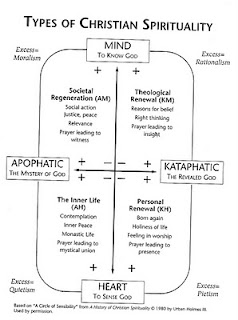Open Evangelicalism....
Interesting conversation sent me looking for this article - thanks Malcolm!
Towards a definition of "Open Evangelical"
"Open evangelical" is a term that has emerged in the context of evangelical Anglicanism in the UK. Broadly speaking it is those who see themselves as heirs of the Keele Congress of 1967, when evangelical Anglicans committed themselves to work in the mainstream of the Church of England, who would want to wear that label. "Open evangelical" is usually defined over against "conservative evangelical", although open evangelicals would claim to be conservative on scripture and radical on everything else.
What are open evangelicals in the Church of England open to ?
1. Biblical scholarship
(Believing scripture to be inspired, but not wishing to wear the inerrantist label, and content to accept that theology is a positive gift to the church, and that hermeneutics are essential to the task of understanding an inspired scripture).
2. Cultural change
An unchanging gospel must be proclaimed in a variety of cultural contexts, and to be open is to be culturally aware and adaptable.
3. Other theological traditions
Open evangelicals would accept that others not owning the evangelical label are also Christians, and would want to learn from them.
4. Holistic mission
Most open evangelicals are convinced that evangelism and social action go hand in hand, and that the motivation for social and political engagement is God's activity and calling to people and churches, and not merely a means of pre-evangelism.
5. The Church of England
A majority of evangelical Anglicans would want to wear the label that way round, with "evangelical" as the adjective that defines "Anglican". This entails a commitment to the structures and ecclesiology of the Church of England.
6. The full ministry of women in the church
Open evangelicals supported the ordination of women to the priesthood (the conservatives didn't), and would argue from scripture that women can be both priests and bishops, and take their full part in the Church of England's ministry.
7. Evangelism
To be an open evangelical is to believe that every structure in the church must pass the acid test "does this further the mission of God?" There is no point in the church being there for its own sake. It is only there as sign of the Kingdom.
8. The World
Open evangelicals are basically world affirming. They believe that the role of the Church of England is to be the church for the whole country, and that to be committed to that view entails working with the grain of society rather than against it.
9. New patterns of worship, prayer, and liturgy
Experiment in the area of worship is a hallmark of open evangelical Anglicanism. They have been in the forefront of devising new liturgy, writing new songs, and encouraging new patterns of worship.
10. God
It is probably the case that open evangelicals have a view of God that sees him more as an agent of change than as a defender of the status quo...
more here
Towards a definition of "Open Evangelical"
"Open evangelical" is a term that has emerged in the context of evangelical Anglicanism in the UK. Broadly speaking it is those who see themselves as heirs of the Keele Congress of 1967, when evangelical Anglicans committed themselves to work in the mainstream of the Church of England, who would want to wear that label. "Open evangelical" is usually defined over against "conservative evangelical", although open evangelicals would claim to be conservative on scripture and radical on everything else.
What are open evangelicals in the Church of England open to ?
1. Biblical scholarship
(Believing scripture to be inspired, but not wishing to wear the inerrantist label, and content to accept that theology is a positive gift to the church, and that hermeneutics are essential to the task of understanding an inspired scripture).
2. Cultural change
An unchanging gospel must be proclaimed in a variety of cultural contexts, and to be open is to be culturally aware and adaptable.
3. Other theological traditions
Open evangelicals would accept that others not owning the evangelical label are also Christians, and would want to learn from them.
4. Holistic mission
Most open evangelicals are convinced that evangelism and social action go hand in hand, and that the motivation for social and political engagement is God's activity and calling to people and churches, and not merely a means of pre-evangelism.
5. The Church of England
A majority of evangelical Anglicans would want to wear the label that way round, with "evangelical" as the adjective that defines "Anglican". This entails a commitment to the structures and ecclesiology of the Church of England.
6. The full ministry of women in the church
Open evangelicals supported the ordination of women to the priesthood (the conservatives didn't), and would argue from scripture that women can be both priests and bishops, and take their full part in the Church of England's ministry.
7. Evangelism
To be an open evangelical is to believe that every structure in the church must pass the acid test "does this further the mission of God?" There is no point in the church being there for its own sake. It is only there as sign of the Kingdom.
8. The World
Open evangelicals are basically world affirming. They believe that the role of the Church of England is to be the church for the whole country, and that to be committed to that view entails working with the grain of society rather than against it.
9. New patterns of worship, prayer, and liturgy
Experiment in the area of worship is a hallmark of open evangelical Anglicanism. They have been in the forefront of devising new liturgy, writing new songs, and encouraging new patterns of worship.
10. God
It is probably the case that open evangelicals have a view of God that sees him more as an agent of change than as a defender of the status quo...
more here

Comments